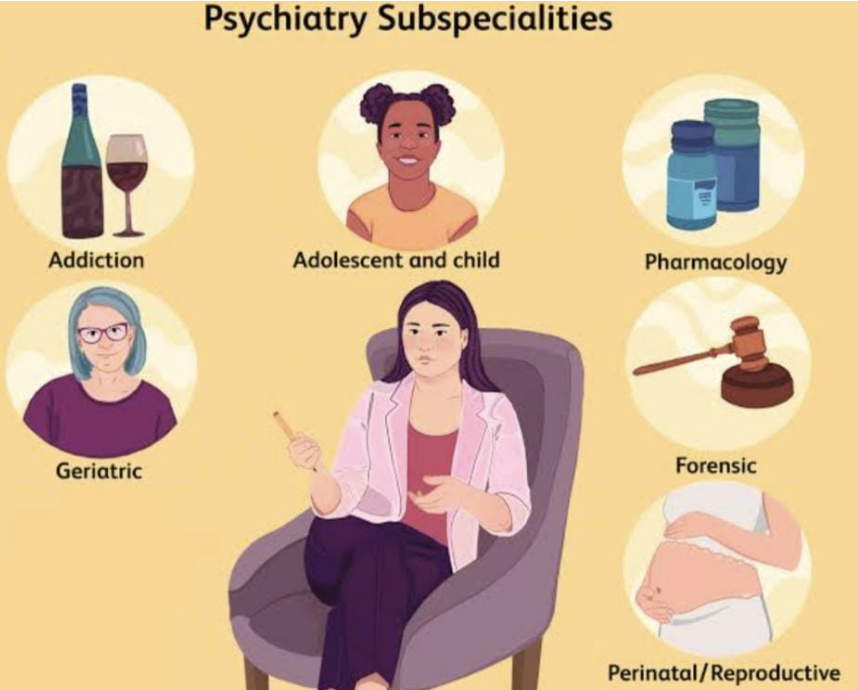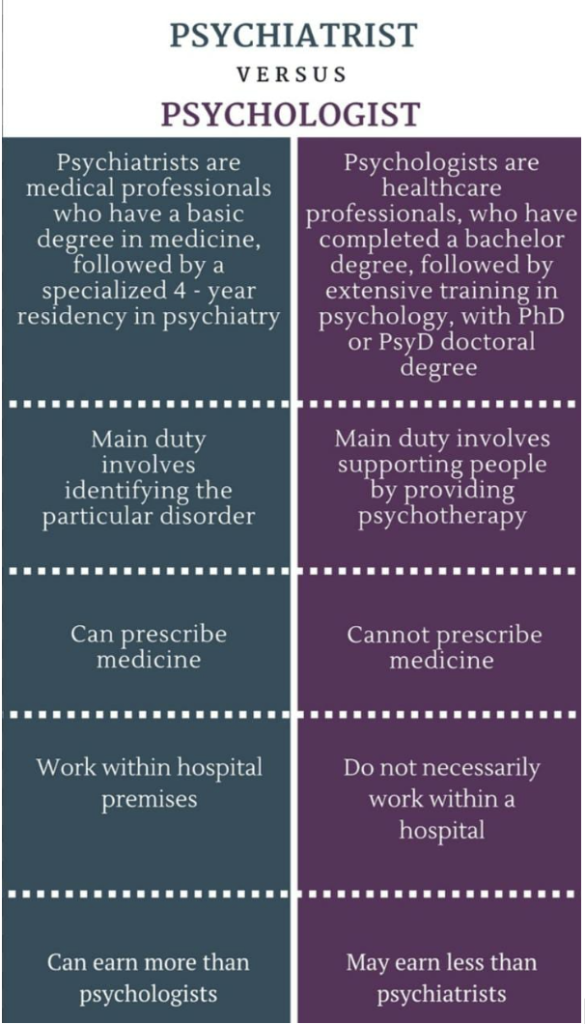Psychologist or Psychiatrist? Let’s Spot the Differences!

Mental health issues have become a huge concern in the 21st century, and conversations surrounding them have also been on the rise. Gone are the days when people preferred to keep their mental health under the wraps – we’re more vocal about discussing our challenges and seeking help for them.
There’s also an increasing demand for therapists to resolve those issues. And when it comes to therapy, your options are aplenty. If you were to do a quick Google search, you might come across appointment options with a psychiatrist, psychologist or other kinds of experts. How do you know which one to choose and when? Allow us to guide you!
When you hear someone say they are a psychologist, don’t you ask if they can read your mind?(FYI, they cannot)
Well, then what do you ask a psychiatrist?
Yes, they are two different professions actually!
If you’re looking to build your career in psychology, it’s important to know the difference between the two by Class 10, as it will determine the education stream you need to get into your chosen path.
Did we get you all confused? Let’s find out how psychologists and psychiatrists are different and when to approach them!
Let’s understand what the two actually mean!
The scientific analysis of the human brain and personality is called psychology. Psychologists work in the field of psychology.They research how people act, think and feel in various social contexts. They are specialists in human behaviour.
In contrast, the medical specialty of psychiatry focuses on the diagnosis of mental disorders, emotional difficulties and unusual behaviour. Psychiatrists examine biological, cognitive and biochemical anomalies to identify mental illnesses and recommend medicines for their treatment.
What are the differences between psychologist and psychiatrist?
The techniques, areas of specialisation and educational paths represent the main differences between psychologists and psychiatrists. They are not the same thing. Let’s dive deeper into these differences:
Method of treatment
A psychiatrist favours medication in their treatment plan. After their diagnosis, they develop a treatment plan for the client, concentrating on symptom management through the use of medicines and psychoanalysis. Psychologists, on the other hand, don’t prescribe medication but use different behaviour modification therapies to treat their patients’ symptoms and help them cope with challenges in their daily lives. They are also certified to administer psychological assessments, which assess a person’s mental health and behavioural characteristics.
For example, a psychiatrist would initially recommend anti-depressant medicines to someone who is depressed or has contemplated ending their life. It would help to manage suicidal thoughts and increase the patient’s receptivity to dialogue and treatment.
After stabilisation, the psychologist will begin therapy to address the underlying causes of the person’s problems and assist them in controlling their negative feelings and ideas.
Areas of expertise
Psychiatrists typically work in medical facilities like hospitals, mental health facilities or at a private practice. Their area of expertise falls under the umbrella of medicine. Advanced specialisation in the realm of mental health is possible for psychiatrists in forensic psychiatry, addiction psychiatry, pain management, sleep medicine, brain injury medicine, etc.
On the other hand, since psychology is the science of human conduct, it may be used in almost any field, including mental health. The name “psychologist” serves as a catch-all for a variety of subfields, including clinical psychology, counselling psychology, child psychology, and others. Psychologists don’t always always deal with mental illnesses – they address behavioural or developmental struggles as well.
Educational Qualifications
If you wish to become a psychiatrist, get an MBBS before continuing on to an MD in Psychiatry. If you wish to become a psychologist, you don’t necessarily need to opt for science. You can get a BA or BSc in Psychology, followed by a master’s degree in the same field. If you want to become a clinical psychologist, you will need to complete an additional two years of study in order to earn an M.Phil. in Clinical Psychology before you can practise as a Clinical Psychologist.
Areas of Treatment
Psychiatrists treat complex health and psychological problems such as severe depression, psychotic activity, extreme anxiety, schizophrenia, bipolar disorder, autism, etc. Psychologists are more likely to consult patients with conditions that involve behavioural concerns, adjustment issues, learning challenges, minor depression and anxiety, which can be efficiently addressed or controlled with psychological therapies.
How to Choose?
A psychologist might be an excellent choice if you’re having a hard time or want to work on better understanding your thinking and behavior. If you are unable to manage your traumas, stress, and depression on your own, you must see a psychiatrist. Psychologists and psychiatrists frequently collaborate. A psychiatrist may conduct a preliminary evaluation and diagnosis before referring you to a psychologist for on-going psychological care. In hospitals, psychologists and psychiatrists collaborate as a member of mental health teams.
While a psychiatrist can prescribe drugs and other therapies to ease your symptoms, a psychologist may assist you in addressing symptoms through therapy and by teaching coping mechanisms.
For example, to manage suicidal tendencies and increase the patient’s receptivity to dialogue and treatment, a psychiatrist would initially prescribe anti-depressant medication to someone who is depressed and has recently tried suicide. Following stabilisation, the psychologist would begin therapy to address the underlying causes of the person’s problems and assist them in controlling their negative feelings and ideas.
Get #CareerReady with Mentoria!
Now that you’re clear about the differences between the two, which field of psychology are you more keen on? Or are you considering a completely different field? Either way, we’ve got you covered! Take our assessment today to discover your areas of interest, potential careers, pathways and colleges for the same, and more!








